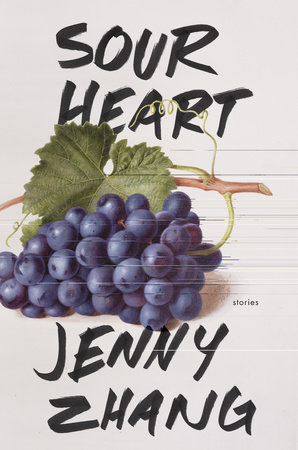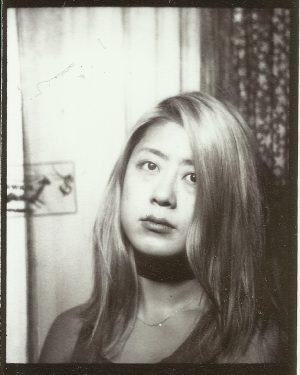This is what makes us girls: a “Sour Heart” review
The debut short story collection from Iowa Writers’ Workshop graduate Jenny Zhang offers a frank and emotional escape into the fraught lives of girls coming of age.

Love her or hate her, Lena Dunham has established herself a place in today’s pop culture. Ever since the HBO series “Girls” took off, her signature coarse humor and form of feminism has divided most of the American public. After releasing her memoir a few years ago, it didn’t come as too much of a surprise when I discovered she had co-founded a new publishing imprint at Random House with close friend and fellow show-runner of “Girls”, Jenni Konner. Why not showcase other talented writers who capture the things you like to talk about in a similar way you do?
The first author to be published from the Lenny imprint is none other than Jenny Zhang. A previously published poet and graduate of the Iowa Writers’ Workshop, Zhang has been known for her sharp writing style that isn’t afraid to get racy. I hadn’t heard about her until I stumbled upon this title on Goodreads. The experiences of Chinese immigrant daughters struggling to survive in 1990s New York sounded interesting, as each girl would offer their own unique perspective and journey. However, a lot of the reviews on the book-reviewing site were divisive, which had me concerned. Nevertheless, her reading at bookstore Prairie Lights was cool, and I was able to get my own copy thanks to West Side Story adviser Sara Whittaker. I was willing to take my chances.
I’m happy I did. “Sour Heart” is a challenging read at points, becoming violent in a way that reminded me of Lana Del Rey at her most glorified. It was messy and gross and uncomfortable, but beautiful and heartrending and captivating at the same time. Zhang captured the pain of these six girls in all its forms, whether it was hunger, jealousy or a desire for something more. She doesn’t shy away from painting attempted assimilation as absolute hell, and she cleverly mirrors it with the daughters coming of age in each of the seven stories. It’s a raw look at destructive family relationships, sexual awakenings and the emotional core of the teenage girl psyche.
The collection is book-ended with two stories from a girl named Christina, one as a child and one as an adult. “We Love You Crispina” and “You Fell into the River and I Saved You!” highlight the hardships and little joys found in life, whether they include going on round-trip bus rides for money or giant teddy bears in an apartment that Christina’s family has all for themselves. Zhang’s signature style also comes through: harsh humor that comes in lines like “I’m going to take a crap now, where’s my coat and my shoes and also that shorter scarf that won’t dangle its way into the toilet….” and long sentences and paragraphs that flow for pages at a time. Reading about Christina’s family as they dumpster-dived and had their stuff stolen was tough, but having it paired with Christina’s sharp tongue and her own growth and anxiety made it even more compelling.

The other five girls are all connected through Christina some way or another, whether a family was sleeping on the mattress next to her as she complained about bedbug itches in a crowded room or a daughter was just waiting to be born in that same situation. Unfortunately, not all of the other short stories are winners. “Our Mothers Before Them” experiments with reflecting on the Chinese Cultural Revolution of 1966 while the protagonist Annie meets her uncle who grew up during that period 30 years later. It gets bogged down with another plot about Annie’s narcissistic mother and becomes too graphic for its own good. A similar scenario happens with “My Days and Nights of Terror” despite some powerful passages.
However, there are some highlights. “The Evolution of My Brother” shows how an older sister’s self-realized mistreatment and protectiveness of her younger brother leaves a lasting impact on him as he grows older. “The Empty the Empty the Empty” shows fourth-grader Lucy becoming more aware of her body and its sexual power as her relationship with her boyfriend and frequent guest at her house comes to a horrifying conclusion. And “Why Were They Throwing Bricks?” brings a grandmother’s malicious power to have control over her grandchildren to the forefront, even as main character Stacey and her younger brother Allen end up gravitating away.
Themes and conflicts overlap with the start of each new chapter, giving these stories a very similar feel. But Zhang uses those similarities to her advantage. She ties them back to the heart of this book: showcasing girls growing up, sometimes without a choice. A loss of innocence, a fight with a sibling or a barbed lie come with consequences that leave a lasting impact on the lives of these daughters trying to get by but having to become older and wiser in a world that won’t treat them like that. The writing helps this fact, and as a result, it really holds the collection together.
Jenny Zhang’s “Sour Heart” won’t be for everyone. Much like Dunham’s Girls, its crass subject matter may be viewed as tasteless or coarse by some readers. But if you’re looking for something different that will capture the rampaging thoughts of teenage girls being forced to grow up amidst terrifying circumstances, look no further.
Your donation will support the student journalists of West High School. Your contribution will allow us to purchase Scholarship Yearbooks, newsroom equipment and cover our annual website hosting costs.

This is Luke's first and only year as a member of West Side Story. He'll be kept busy with anchoring, editing and reporting, but he's gonna have fun while...


